Ronnie and Nancy (41 page)
Authors: Bob Colacello

Lieutenant Reagan with Jane
and little Maureen
the day he reported for
military service, April 19, 1942.
(A.P. Wide World Photos)
Screen Actors Guild leaders
Robert Montgomery,
George Murphy, and
Ronald Reagan after testifying
before HUAC, October 23, 1947.
(A.P. Wide World Photos)
Reagan and Lauren Bacall
with President
Harry Truman during his
1948 campaign.
(Al Humphreys/Los Angeles
Times)
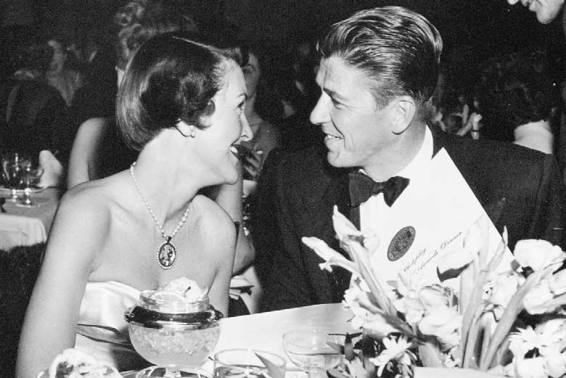
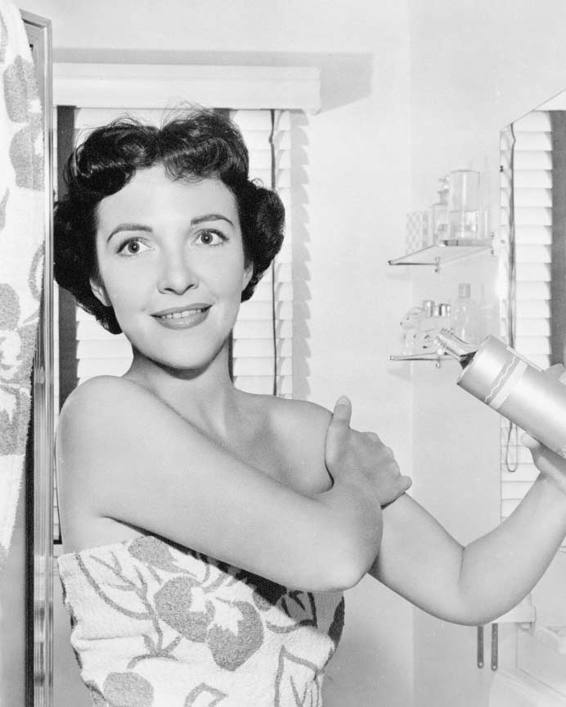
Nancy Davis and Ronald Reagan on a date at a Beverly Hills Hotel gala.
(Globe Photos)
Nancy in a 1950
promotional photo
for Metro-Goldwyn-Mayer.
(Photofest)
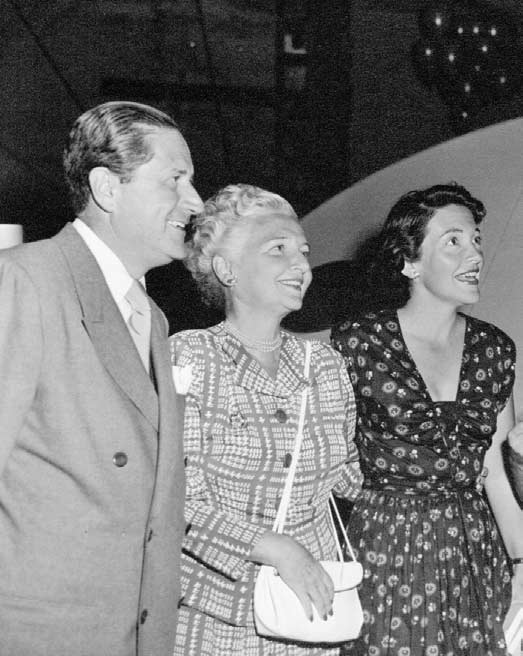
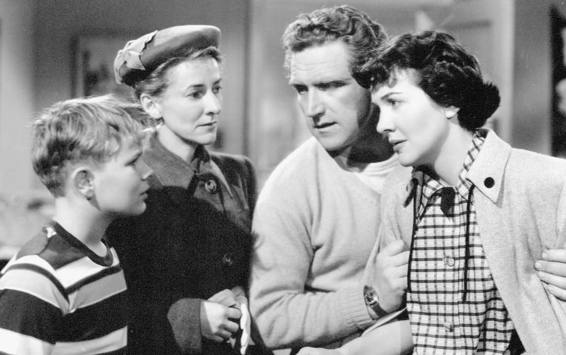
Loyal and Edith
with Nancy in Hollywood,
July 1949.
(Collection of Richard Davis)
Nancy with her co-star James Whitmore, filming
The Next Voice You Hear
, 1950.
(Lester Glassner Collection/Neal Peters)
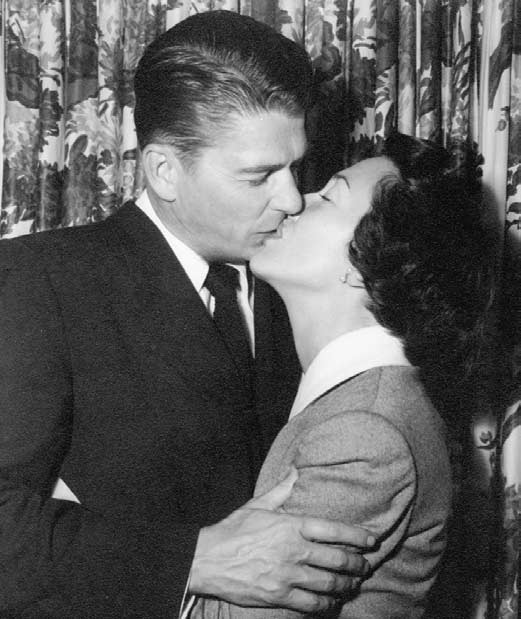
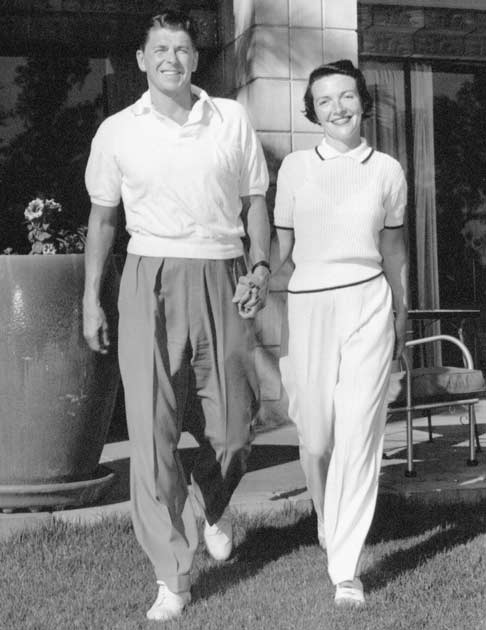
Ronnie and Nancy
on their wedding day,
March 4, 1952,
photographed at the home
of their witnesses,
William and Ardis Holden.
(Reagan Family Photo
Collection)
The newlyweds on their
honeymoon at the
Arizona Biltmore Hotel
in Phoenix.
(A.P. Wide World Photos)
C H A P T E R T E N
RONNIE AND NANCY
IN HOLLYWOOD
1949–1952
It looks as though Nancy Davis, Dr. and Mrs. Loyal Davis’ talented actress daughter, may have the break for which she has hoped and persevered. She is in Hollywood now, waiting for the cameras to start rolling on “Death in the Doll’s House,” in which she has a role.
Cholly Dearborn,
Chicago Herald-American
, March 24, 1949
Hollywood is bounded on the North by legend, on the East by rumor, on the West by scandal and on the South by superstition. Somewhere within those boundaries lies the actual Hollywood community so many talk about and so few really know.
Dore Schary,
Case History of a Movie
, 1950
A FEW DAYS AFTER THE TELEVISION ADAPTATION OF
RAMSHACKLE INN
AIRED
on January 2, 1949, Nancy Davis received a call from her agent telling her that “someone from Metro” had seen her performance and suggested that she come out to the coast for a screen test. Nancy was so excited that, as she put it in her autobiography, “I started packing before I hung up the phone.” She added proudly, “This was one opportunity that none of my family friends had anything to do with.”1
Nonetheless, she immediately called her mother in Chicago, and Edith began working the phone on her daughter’s behalf, starting with a call to Spencer Tracy, urging him to make sure that Nancy was handled with kid gloves.2 By mid-January, Edith and Loyal were in Phoenix, a month earlier than they usually arrived for their annual six-week stay at the Arizona Biltmore Hotel, and Nancy joined them. So did Spencer and Louise Tracy, 2 2 5
2 2 6
Ronnie and Nancy: Their Path to the White House who were traveling with their good friend Benjamin Thau, MGM’s vice president in charge of talent and the executive who supervised screen tests at the studio.3
Benny Thau was forty-nine and still a bachelor. (“Thau pronounced his name like winter thaw,” noted Leonora Hornblow. “The joke was Benny never thawed.”)4 A short, heavyset man who wore his thinning hair slicked back, he spoke in a deliberate near-whisper that forced people to listen closely to what he said. He had started out in show business as a vaudeville booker in New York and was made casting director of MGM by Louis B. Mayer in 1928. “From then on,” according to Mayer biographer Charles Higham, “Thau’s casting couch was the busiest in Hollywood.”5
Thau was notorious for demanding sexual favors from starlets whose careers he advanced, for carrying on affairs with married actresses (most notably Greer Garson, whom he made an overnight star), and, according to Higham, even for organizing Christmas Eve orgies on the MGM lot during the 1930s.6 He was immediately taken by Nancy’s ladylike looks and manners.
“It was my impression that Benny was there to see Bob Rubin, who was with Metro in New York,” Nancy Reagan told me, referring to MGM’s longtime East Coast vice president and general counsel, J. Robert Rubin. “Bob and his wife stayed at the Biltmore every year and became good friends of my parents’.”7 Richard Davis said that his father had taken an instant dislike to Benny Thau and strongly disapproved of Edith’s backstage machinations on Nancy’s behalf. “Dr. Loyal was all for someone getting ahead on his or her own,” Davis told me. “To have the inside track was against his principles. And he didn’t want his daughter to be mixed up with this man at all. I think my father thought this whole Hollywood thing was a little unsavory for his daughter. But Edith encouraged it.
Edith would say, ‘Well, you have to make a few compromises if you want to get anywhere.’ My father was not that way. He wouldn’t compromise for anything or anybody.”8
A newspaper photograph of the Davises, Thau, and Louise Spencer at the opening of the new Sombrero Playhouse confirms their presence in Phoenix that month, as well as Richard Davis’s take on his parents’
conflicting attitudes: as Edith studies the Hollywood big-shot with interest, Loyal casts his wife a stern glance. Nancy is not in the picture, but she saved it in her scrapbook, a rare piece of printed evidence linking her to a man she never mentioned in any of her books or talked about in in-Ronnie and Nancy in Hollywood: 1949–1952
2 2 7
terviews.9 Her silence only fueled suspicion that she had something to hide, and several previous biographers, unaware of their meeting in Phoenix, have written that Nancy met Thau on a blind date in New York shortly before her screen test and that she became his girlfriend in Hollywood.10
This version of events was largely based on an interview Thau gave, at age eighty, to Laurence Leamer, the first Reagan biographer to research Nancy’s background in some depth. Recalling a trip to New York in early 1949, Thau said that a friend had suggested, “If you want to take somebody out to a show, call Nancy Davis. She’s a nice girl who likes company.” Over dinner after the theater, Thau said, he uttered the magic words: “Nancy, why don’t you come out and make a screen test?” Thau’s memory was not airtight, however; he told Leamer that he had taken Nancy to see a play starring Spencer Tracy, but Tracy’s last play,
The Rugged Path
, had closed more than two years earlier.11
Nancy Reagan told me there was no blind date—or love affair. “I never had dinner with Benny in New York,” she said. “When I came out to Los Angeles to do the test and stayed—yes, then I saw him, had dinner with him, and so on. . . . I was
not
his girlfriend. He took a liking to me, that’s true . . . and I liked him as a friend. But that was it, as far as I was concerned.”12
In any event, Spencer Tracy had lined up another powerful MGM executive on Nancy’s behalf, Dore Schary, vice president in charge of production. Schary had been brought over from RKO the previous year by Nicholas Schenk, the head of Loew’s Inc., MGM’s New York–based parent corporation, and it was generally thought that it was only a matter of time before he replaced the aging Mayer. Schary, a former screenwriter, had been close to Tracy since 1938, when he wrote the script for
Boys
Town
, which won Oscars for both of them. At some point before Nancy’s screen test, Tracy called Schary and, playing to the executive’s preference for intellectual message films, recommended Nancy as a serious actress.
“The girl,” he said, “knows how to look like she’s really thinking when she’s onstage.”13
Schary was drawn into Nancy’s camp by other means as well. Like Mary Martin, he suffered from chronic back problems, and shortly before Nancy was signed, he had called Loyal Davis for advice about an operation.14 It is not clear who recommended Nancy’s stepfather to Schary, but he became a 2 2 8
Ronnie and Nancy: Their Path to the White House regular patient. According to Nancy’s New York publishing pal Kenneth Giniger, it was Schary “who brought her out to the coast. That’s what I understood from her at the time.”15 However, there can be little doubt that meeting Thau in Phoenix advanced matters immeasurably.